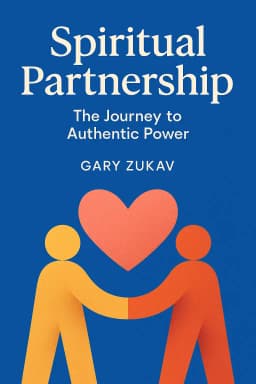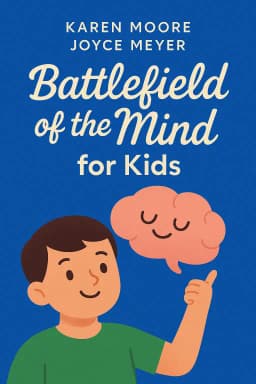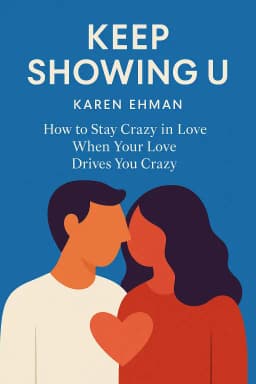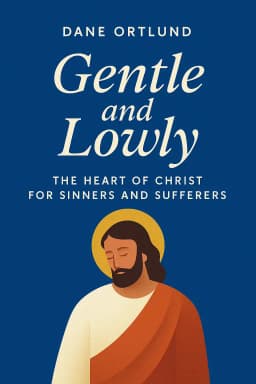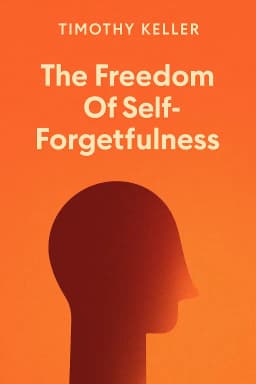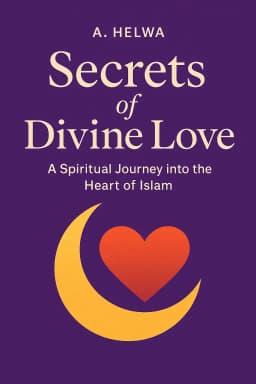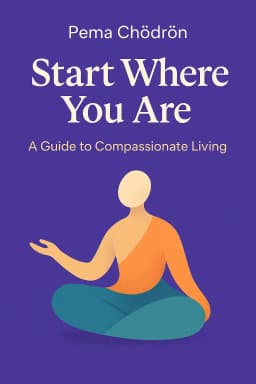
Unhurrying Your Soul
How to Stay Emotionally Healthy and Spiritually Alive in the Chaos of the Modern World
Golden Hook & Introduction
SECTION
Sophia: Daniel, I just read a statistic that the average person touches their phone 2,617 times a day. That’s not even using it, just touching it. It feels less like a tool and more like a nervous tic at that point. Daniel: That is the perfect description for it. A nervous tic. And it’s the exact ‘hurry sickness’ that John Mark Comer tackles in his incredibly popular book, The Ruthless Elimination of Hurry. Sophia: Ah, I’ve seen that one everywhere. The title alone feels both aspirational and completely impossible. Daniel: Exactly. And what's fascinating is that Comer wasn't some philosopher in an ivory tower; he was a megachurch pastor in Portland, Oregon, leading a fast-growing, successful church. But he was secretly miserable and experienced a complete burnout, which forced him to write this. Sophia: So this came from a personal crisis, not just a theory. Daniel: Precisely. The book became a massive bestseller and is highly rated by readers, I think because it tapped into this universal feeling he describes, borrowing from a philosopher, as being 'too alive to die, but too dead to live.' It’s for anyone who feels like they’re constantly running on a treadmill and forgetting why they even stepped on. Sophia: I think that’s… most of us. So, this ‘hurry sickness’—it’s more than just having a packed schedule, right? Daniel: Oh, much more. Comer argues it’s the deep, internal state of franticness, inadequacy, and anxiety that our culture now treats as normal. He says it’s the great enemy of our spiritual and emotional lives.
The Diagnosis: Hurry as the Devil of the Modern Soul
SECTION
Sophia: Okay, "the great enemy of spiritual life." That’s a bold claim. Most people would say their biggest problem is money, or their job, or their relationships. Why does he point the finger at hurry? Daniel: Because he argues it’s the root system under all those other problems. And his own story is the most powerful case study in the book. He was in his early thirties, pastor of a church that was exploding in growth—by all external metrics, he was a huge success. Sophia: The dream, for a pastor. Daniel: You’d think so. But he describes himself as emotionally empty, spiritually shallow, and becoming a person he didn’t even like. He was working six days a week, preaching multiple services, and his main coping mechanism was zoning out to kung fu movies late at night just to feel something. Sophia: Wow. That’s a very specific and telling detail. The kung fu movies. It’s a form of escape. Daniel: A total escape. The breaking point came when he had this terrifyingly clear vision of his future self. He saw himself at sixty—a successful author, a famous speaker, with a huge church… but his soul was gone. He was emotionally unhealthy, his kids didn't talk to him, and he was just an empty shell of a man. Sophia: That’s chilling. It’s the classic story of gaining the world but losing your soul, but in a very modern, corporate-pastor kind of way. Daniel: Exactly. And he realized, in his words, "In America you can be a success as a pastor and a failure as an apprentice of Jesus." That realization was so jarring that a few months later, he resigned from his leadership position. He essentially demoted himself to lead a much smaller, quieter church plant. He took a sabbatical, started therapy, and began this long, slow journey of detoxing from hurry. Sophia: That takes incredible courage. To walk away from the very thing that the world, and even his own community, defined as success. Daniel: It’s a radical move. And it’s why the book’s title uses the word ‘ruthless.’ He quotes his mentor, the philosopher Dallas Willard, who told him, "You must ruthlessly eliminate hurry from your life. There is nothing else." Sophia: "There is nothing else." That’s so absolute. But what does it mean in practice? I mean, hurry feels like a non-negotiable part of modern life. Daniel: Well, Comer breaks it down. He says hurry is fundamentally incompatible with the things we actually want most. Take love, for example. He gives this painfully relatable scenario of trying to get his family out the door when they're running late. Sophia: Oh, I know this scene. This is my life. Daniel: Right? He says in those moments, he’s not loving. He’s irritable, he’s nagging, he’s tense, he’s critical. He’s the opposite of patient and kind. Love requires presence, and hurry makes presence impossible. The same goes for joy and peace. You can't be joyful when you're anxious about the next thing, and you can't be at peace when your mind is a frantic mess. Sophia: That’s so true. My worst moments as a parent, as a partner, as a friend… they are always when I’m in a hurry. I’m just a worse version of myself. Daniel: And that's his whole point. Hurry isn't just an inconvenience; it's a moral and spiritual problem. He quotes a Finnish proverb: "God did not create hurry." It’s this artificial, human-made toxin we’ve all been drinking. And technology has put it on hyper-speed. That phone-touching statistic is just one symptom of a world that’s in an "arms race for our attention," as he puts it. Sophia: An arms race for our attention. That’s a powerful way to frame it. It’s not a neutral environment; it’s actively hostile to our peace of mind. Daniel: Exactly. Tech companies are intentionally designing products for addiction. Our distraction is their profit model. So we're not just fighting our own bad habits; we're fighting a multi-trillion-dollar industry.
The Prescription: The 'Easy Yoke' and the Four Practices
SECTION
Sophia: Okay, I'm convinced it's a problem. A big one. But ‘ruthlessly eliminating’ it sounds… well, ruthless. And maybe impossible for anyone who isn't a former megachurch pastor who can just decide to change his entire life. What's the actual solution here? Is it just ‘do less’? Daniel: That's the key question, and his answer is surprising. The solution isn't just to do less, or even to manage your time better. He says if you had ten extra hours a week, you’d just fill them with more stuff and be just as exhausted. The solution is to adopt a whole new "operating system" for your life. Sophia: A new operating system? What does that mean? Daniel: He grounds it in this invitation from Jesus in the Bible: "Come to me, all you who are weary and burdened, and I will give you rest. Take my yoke upon you and learn from me… for my yoke is easy and my burden is light." Sophia: The ‘easy yoke.’ I’ve heard that phrase, but it always sounds a bit abstract. Daniel: Comer makes it very concrete. A yoke is a tool that allows an ox to pull a heavy load. Jesus is saying that life is hard—the load is real—but he offers a way to carry it with ease and grace. To take his ‘easy yoke’ is to become his apprentice—to organize your life in the same way he organized his. It’s about adopting his lifestyle and his rhythms. Sophia: So it’s not about believing certain things, it’s about doing certain things? It’s a practice. Daniel: It’s entirely a practice. And he boils it down to what he calls a "Rule of Life," which is an ancient concept for a schedule and set of practices that create space for God in the chaos. He proposes four core practices for unhurrying your life. They are Silence and Solitude, Sabbath, Simplicity, and Slowing. Sophia: Okay, let's break those down. Silence and solitude. In a world of constant noise and connection, that sounds like the most counter-cultural thing you could possibly do. Daniel: It is. He argues that our phones have stolen all the little moments of boredom we used to have—waiting in line, at a red light, on the elevator. Those were potential portals to prayer, to our own thoughts, to God. Now, they're just portals to Instagram. The practice is to intentionally build silence and solitude back into your life. Start with five minutes. Turn off the radio in the car. Go for a walk without your phone. Sophia: That sounds both simple and incredibly difficult. Okay, what's the second one? Sabbath. Daniel: Sabbath is more than just a day off. The Hebrew word, Shabbat, literally means "to stop." It’s a full 24-hour period where you stop working, yes, but also stop wanting, stop worrying, and stop buying. It's a day to rest and to delight in God, in creation, in your family, in food. It's a radical act of resistance against a culture of 24/7 productivity and consumerism. Sophia: I love the idea, but I can already hear the objections. What about single parents, or people working two jobs, or gig economy workers who have to hustle every day? A full 24-hour Sabbath can sound like a luxury. Daniel: That's a fair critique, and one that's often leveled at the book. Comer acknowledges it's difficult. He suggests starting small. Maybe it’s not a full day at first. Maybe it's a Sabbath afternoon. Or a Sabbath hour. The principle is to intentionally build in a rhythm of stopping, to trust that the world will not fall apart if you are not constantly producing. It’s a practice of faith. Sophia: A practice of trust. I like that. Okay, number three was simplicity. This one also feels trendy right now, with minimalism and Marie Kondo. How does he frame it? Daniel: He frames it as an antidote to the lie that more stuff equals more happiness. He cites that famous study that found emotional well-being basically caps out at an income of around $75,000. Beyond that, more money doesn't make you happier. Simplicity is about intentionally curating your life—your possessions, your schedule, your spending—around the things that truly matter, which are almost always relationships. Sophia: So it’s not necessarily about having an empty, white-walled apartment. It’s about making sure your resources—your time and money—are actually going toward your values. Daniel: Precisely. It’s about breaking the addiction to consumerism, which he calls an "engine for hurry." We work more to buy things we don't need, which makes us more hurried and stressed. It's a vicious cycle. Simplicity is the way out. Sophia: And the last one? Slowing. Daniel: This one might be the most practical and immediate. It’s the simple, physical discipline of slowing your body down. He gives a few examples: drive the speed limit. Get in the longest line at the grocery store on purpose. Don't look at your phone while you wait. Practice single-tasking instead of multitasking. Sophia: Getting in the longest line… on purpose? That sounds like a form of self-torture to my hurried brain. Daniel: (laughs) I know! But it’s a way of training your soul. It’s about intentionally putting yourself in a position where you have to wait, where you have to be patient. It’s about slowing your body down to a pace where your soul can catch up and, as the Psalm says, "taste and see that the Lord is good."
Synthesis & Takeaways
SECTION
Sophia: So when you boil it all down—silence, Sabbath, simplicity, slowing—is this a book about time management, or is it something deeper? Daniel: It’s so much deeper. It's not about managing your time; it's about tending to your soul. Comer's ultimate argument is that the modern world is fundamentally designed to make us hurried, anxious, and distracted. It’s a spiritual battle for our attention. These ancient practices are our weapons, our defense. Sophia: So the goal isn't to become more productive or efficient by being less stressed. Daniel: Not at all. In fact, it might make you less "productive" by worldly standards. The goal is to become more present. More human. To be more available to God, to the people you love, and even to yourself. He quotes the Apostle Paul, who told a church to "make it your ambition to lead a quiet life." Sophia: A quiet life. That is the opposite of almost every ambition our culture promotes. We’re told to be loud, to build a platform, to have a brand, to hustle. Daniel: Exactly. Comer is calling for a counter-revolution of quiet. He says the fight for a quiet life is the fight for a good soul. It's a choice between the wide, easy path of hurry that leads to a shallow life, and the narrow, more difficult path of intentionality that leads to a deep one. Sophia: It feels like the real challenge isn't just implementing these four practices, but fundamentally changing your definition of a successful life. Daniel: That’s the heart of it. It’s about letting go of the world’s scorecard and picking up a different one. And he’s clear that it’s a practice, not perfection. He says he fails all the time. The key is to just keep beginning again. Three steps forward, two steps back is still one step forward. Sophia: So the challenge for us, for anyone listening, isn't to perfectly adopt all four practices tomorrow. It’s to just choose one thing. Daniel: Yes. Maybe just drive the speed limit for a week and see what happens. Maybe leave your phone in another room for one hour tonight. Start small. The book asks a really powerful question that I think is a great place to end: What if the life you really want is hidden in the very rhythms you've been taught to rush past? Sophia: A life hidden in plain sight. That’s a beautiful and hopeful thought. Daniel: This is Aibrary, signing off.
